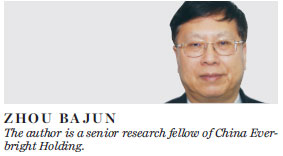The economic era of 'positive non-intervention' is finally over
Updated: 2015-08-12 08:17
By Zhou Bajun(HK Edition)
|
|||||||
In an earlier interview with Xinhua News Agency, Chief Executive Leung Chun-ying said the SAR government must abandon the outdated "positive non-intervention" mentality toward economic development. He said Hong Kong must adopt a proactive approach in providing more support and guidance to the local business sector. Leung noted that the governments of Singapore and South Korea, two of Hong Kong's major economic competitors in the region, have played an active role in promoting economic development in their respective countries. For example, the Singaporean government has been actively exploring ways to participate in the "One Belt, One Road" strategy, and the South Korean government has backed development of the country's creative culture industry.
Since the establishment of the Hong Kong Special Administrative Region, this was the first time a Chief Executive had explicitly declared that the laissez-faire policy - a colonial legacy - was outdated. Leung argued that it was time for an appropriately proactive government to phase in and take the lead in economic development.
Indeed, the laissez-faire policy was only appropriate in the context of Hong Kong's economic and social development from the late 1960s to the 1980s. But from the early 1980s, the labor-intensive manufacturing industry in Hong Kong began facing major challenges. There was an economic transformation occurring internationally. So it was necessary for Hong Kong to not only shift its manufacturing industry to the Pearl River Delta area of Guangdong province, but also promote high-tech manufacturing industries in Hong Kong. Unfortunately, the colonial government stubbornly stuck to its "positive non-intervention" policy. It refused to formulate policies to promote the development of high-tech industries in the city.
Eventually this inaction by the government, coupled with the structural deficiencies of local business sectors, led to the decline of the local manufacturing industry. Some 85 percent of the labor-intensive manufacturing industry shifted its production base to the Pearl River Delta region within a decade, from the 1980s to the 1990s. As a result, many of Hong Kong's industries suffered.
While local property developers have grown rapidly and amassed huge capital since the 1980s, local manufacturing companies have remained mostly small or medium-sized enterprises. They are financially incapable of embracing innovation - even if they want to. This has made it all the more imperative for the SAR government to take the lead and proactively promote the development of high technology to transform Hong Kong's industrial base.
It is not difficult to figure out why the colonial government stuck to the laissez-faire policy in the late 1980s. The development of high-tech industries requires years of investment and policy support. After the Sino-British Joint Declaration was signed in 1984, London had no interest in investing in the future of Hong Kong.
After the handover, heavily influenced by the traditional policies, successive SAR governments failed to shake off the "positive non-intervention" mentality. That is the reason why Hong Kong remains dependent on real estate as a core sector and has failed to build a knowledge-based economy.
As the saying goes, "Better late than never." Leung's declaration that the outdated "positive non-intervention" policy will be abandoned suggests the government will play a proactive role in promoting economic transformation and development. All sections of Hong Kong society, especially the pro-establishment camp, should support the government's initiatives in this respect.
The shift from "positive non-interventionism" to "appropriately proactive governance" should not just be rhetoric. It should be a gradual transformation of the government's economic philosophy. This requires adjustments within the framework of government.
Civil servants, who primarily comprise the body of the SAR government, need to change their way of thinking. This is so they can adapt to the more active role of the government regarding economic development. In the face of a changing global economy and increasingly intense competition, such apolitical adjustments will pose no difficulties to civil servants. It will not affect the political neutrality they greatly value.
The "appropriately proactive governance" advocacy of the CE is closely associated with the government's determination to actively participate in the "One Belt, One Road" strategy advocated by the central government. It is likely that radical opposition groups will attack it by resorting to "nativism". It is hoped that moderates in the opposition camp will draw a line between themselves and the radicals, and support the government. The advocacy of "appropriately proactive governance" is aimed at promoting economic development. It should never be politicized to promote a personal or political agenda.

(HK Edition 08/12/2015 page12)